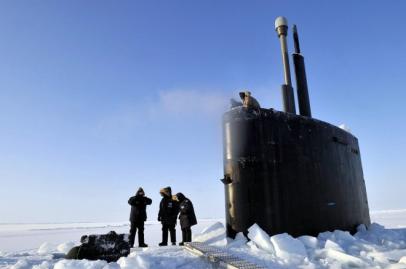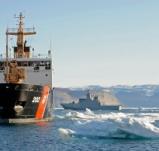Arctic Security

Climate change, melting icecaps, the building promise of trans-Arctic shipping, and increasing access to resources all lead toward intensified attention to the Arctic, by states with parts of their territories within the region and by key states well beyond the region. The security implications are profound.
While Arctic “security” must ultimately be about the safety and well-being of the people of the Arctic and the social and economic circumstances that affect their daily lives, broader international security concerns and military relations among Arctic states also have extensive and consequential implications. Throughout the Cold War, the Arctic was a critical arena in the nuclear stand-off between the two major protagonists, Russia and the United States – global rivals and Arctic neighbors. After 1989, concerns shifted prominently to environmental, economic, and public safety issues, but intra-regional relations and traditional peace and security concerns were clearly never fully off the agenda.
Competing continental shelf claims, some ongoing border disputes, steadily increasing maritime traffic, and renewed military deployments and infrastructure are once again driving Arctic defence and regional peace and security issues more broadly to the fore. Accelerated Arctic warming necessarily also accelerates international attention to the region and brings new urgency to sovereignty, territorial integrity, and security issues – joining a daunting array of environmental and economic challenges.
The focus of these Arctic security briefings is largely on security relations among Arctic states, military programs, and operations, but an overarching interest is in exploring prospects for the emergence of the Arctic as a regional security community. Through the Ilulissat declarations (2008 and 2018), Arctic States have already formally pledged to eschew force and to rely instead on existing international law, notably the Law of the Sea, for the “orderly settlement” of disputes in their rapidly changing region. It is an important commitment and has led some regional leaders to affirm that the Arctic can be seen as a region of peace and stability that is committed to dialogue and cooperation – in that they echo the former Soviet Union President Mikhail Gorbachev’s famous 1987 Murmansk speech, which envisioned the Arctic as a “zone of peace.”
But there are also, of course, serious reasons to question the sustainability of the Arctic as a zone of stability that will continue to rely on dialogue and cooperation. Russia’s 2007 titanium flag drop on the sea-bed at the North Pole is still recalled, Russia’s determined northern military build-up is ongoing, competing continental shelf claims will remain a continuing reality, and the intensified interest in the region’s natural riches and its marine passage ways between the Atlantic and Pacific Oceans mean the challenges are, like the Arctic itself, extraordinary.
One obvious and urgent question is the extent to which the significant Russian military build-up challenges or supports the development of a stable, cooperative region. Russia’s northern military forces, especially the nuclear forces of its Northern Fleet, have long been at the centre of the Soviet Union’s and Russia’s global posture, and haven’t necessarily reflected Arctic-specific intentions or ambitions. At the same time, Russia is engaged in establishing a series of military bases across its Arctic region, from the Pacific side of the Bering Strait in the west, all the way to the Kola peninsula in the east. Are these expanding military capabilities oriented primarily toward providing a maritime infrastructure for the Northern Sea route and to monitoring and protecting Russia’s Arctic frontier, or do they represent ambitions to drive Arctic events beyond its own territorial interests?
There are also persistent calls to explore the conditions and opportunities to declare areas of the Arctic a nuclear-weapon-free zone, or to seek the permanent demilitarization of the surface waters of the central Arctic Ocean. These are perhaps overly visionary ambitions, but long-term traditional security rivals are now prodded by pragmatism and mutual self-interest to cooperate in the Arctic. As the Ilulissat Declaration attests, there already exists a frequently articulated expectation that the states of the Arctic will not resort to war or overt military intimidation to prosecute their disputes.
That begs the key question: is expectation of the peaceful settlement of disputes a reliable, long-term, expectation, or is it being challenged, either by military build-ups in the north or by disputes among Arctic states in other parts of the world? Are Arctic military programs evidence of an Arctic arms race, or are they evidence of security cooperation and capacity-building for domestic and cross-border support to civil authorities in search and rescue, in monitoring regional activity, and in ensuring compliance with national and international regulations?
The imperatives of Arctic cooperative security are substantial and urgent. The Arctic has been a region of cooperative security entrepreneurship – from cross border cooperation in search and rescue and oil-spill mitigation to the creation of the Arctic Coast Guard Forum – and a key regional question continues to be the extent which it can continue to build mutually beneficial arrangements and institutions that will enhance confidence towards an increasingly reliable and durable regional cooperative security posture.
Featured Resources:
Arctic Security Briefing Papers: occasional briefings focussing on military policies and practices in the Arctic region by Ernie Regehr, O.C., Senior Fellow in Arctic Security and Defence, The Simons Foundation Canada.
Military Footprints in the Arctic by Ernie Regehr, O.C., Senior Fellow in Arctic Security and Defence, The Simons Foundation Canada with Kelsey Gallagher, Researcher, Project Ploughshares
March 2024









